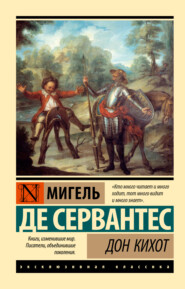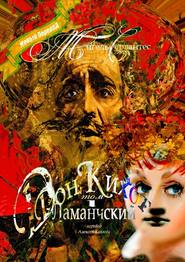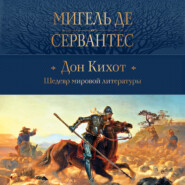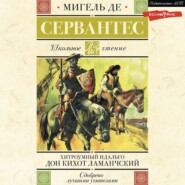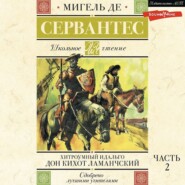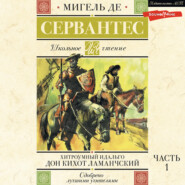По всем вопросам обращайтесь на: info@litportal.ru
(©) 2003-2025.
✖
The History of Don Quixote, Volume 2, Part 36
Настройки чтения
Размер шрифта
Высота строк
Поля
One of the squires observed in his mixture of Gascon and Catalan, "This captain of ours would make a better friar than highwayman; if he wants to be so generous another time, let it be with his own property and not ours."
The unlucky wight did not speak so low but that Roque overheard him, and drawing his sword almost split his head in two, saying, "That is the way I punish impudent saucy fellows." They were all taken aback, and not one of them dared to utter a word, such deference did they pay him. Roque then withdrew to one side and wrote a letter to a friend of his at Barcelona, telling him that the famous Don Quixote of La Mancha, the knight-errant of whom there was so much talk, was with him, and was, he assured him, the drollest and wisest man in the world; and that in four days from that date, that is to say, on Saint John the Baptist's Day, he was going to deposit him in full armour mounted on his horse Rocinante, together with his squire Sancho on an ass, in the middle of the strand of the city; and bidding him give notice of this to his friends the Niarros, that they might divert themselves with him. He wished, he said, his enemies the Cadells could be deprived of this pleasure; but that was impossible, because the crazes and shrewd sayings of Don Quixote and the humours of his squire Sancho Panza could not help giving general pleasure to all the world. He despatched the letter by one of his squires, who, exchanging the costume of a highwayman for that of a peasant, made his way into Barcelona and gave it to the person to whom it was directed.
The unlucky wight did not speak so low but that Roque overheard him, and drawing his sword almost split his head in two, saying, "That is the way I punish impudent saucy fellows." They were all taken aback, and not one of them dared to utter a word, such deference did they pay him. Roque then withdrew to one side and wrote a letter to a friend of his at Barcelona, telling him that the famous Don Quixote of La Mancha, the knight-errant of whom there was so much talk, was with him, and was, he assured him, the drollest and wisest man in the world; and that in four days from that date, that is to say, on Saint John the Baptist's Day, he was going to deposit him in full armour mounted on his horse Rocinante, together with his squire Sancho on an ass, in the middle of the strand of the city; and bidding him give notice of this to his friends the Niarros, that they might divert themselves with him. He wished, he said, his enemies the Cadells could be deprived of this pleasure; but that was impossible, because the crazes and shrewd sayings of Don Quixote and the humours of his squire Sancho Panza could not help giving general pleasure to all the world. He despatched the letter by one of his squires, who, exchanging the costume of a highwayman for that of a peasant, made his way into Barcelona and gave it to the person to whom it was directed.






